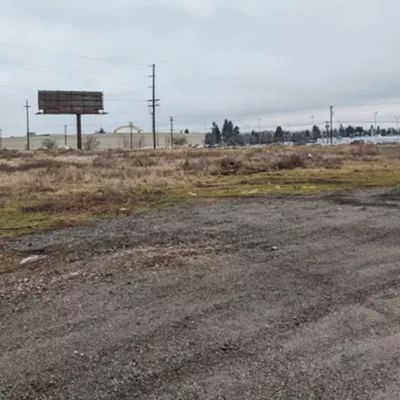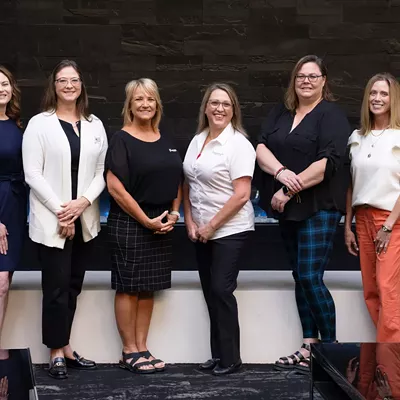Sunday sermons are possibly the best forum for people to receive powerful messages about their lives. So it's especially troubling to be told that many church leaders resist talking about one of the most troubling and prolific community issues: domestic violence.
Despite the fact that intimate partner violence is the single greatest cause of injury among U.S. women, more so than car accidents, muggings and rape combined, some advocates for ending domestic violence against women say religious leaders are in denial. To raise awareness, a group of pastors, ministers and other church leaders from the Spokane area is planning a series of events coming in mid-March aimed at educating church leaders and the public about domestic violence.
"Domestic violence and sexual assault doesn't care if you ride a Lexus, if you're a lady on the street or in the corporate world, if you're an African American or if you're white," says Assistant Pastor Stephaine Nobles-Beans from The Tree of Life Ministries. Statistics show nearly half of all women will be the victims of domestic violence at some point in their lives, and Nobles-Beans says church leaders can no longer remain silent. Still, she knows how strong denial can be, being a church leader herself -- and also having been a victim. "From the pulpit to the door, it is fear that keeps [churches] from talking about domestic violence," she says.
Nobles-Beans, who counsels prisoners and troubled youth, says that victims need more from their churches than just prayer and encouragement: "People need to know whom to call, where to go, how to get help." So she started Wings, a nonprofit organization dealing with sexual assault and intimate partner violence. "Our program is education, awareness and support," Nobles-Beans says. Yet out of hundreds of calls requesting support and participation, only four churches responded. "We need to step up to the plate," she says. "We know there are women and children getting hurt."
Not only have church leaders largely refused to address domestic violence, but throughout history they've often made it worse. "It's played out in destructive ways, where victims were counseled and sent back to the perpetrator in the name of keeping a family together," says Pastor Mark Nelson, assistant to the bishop of the Eastern Washington-Idaho Synod of the Evangelical Lutheran Church in America. "It was sort of a blame the victim attitude."
Nelson is one of several area leaders who are working to organize Ending Domestic Violence: Why the Entire Community Must Be Involved, a series of workshops and worship sessions with Rev. Al Miles, a noted expert on domestic violence. The Interfaith Council, a local organization that supports interfaith education and activities, is hosting the events. The Council says that churches of all denominations have put domestic violence on the back burner.
"Across the board, in black churches and white, in Protestant and Catholic churches, in the Jewish and Muslim faiths, there is a reluctance to talk [about domestic violence]," says Kateri Caron, director for the Interfaith Council, who adds that many church leaders think issuing a formal statement is enough.
"Churches can't just make a statement. They need to do the work. For generations, we've been telling women, 'You need to be a better wife,' so now we need to work for generations to change that."
With the help of domestic violence expert Sandi Thompson Royer, Caron formed the Circle of Caring, a faith-based group devoted to educating church leaders and their congregations about domestic violence. Circle of Caring recently received the first faith-based initiative grant from the Violence Against Women Act of Washington state. With the grant money, the group is working to create networks among religious and secular advocates for ending domestic violence. "We've been working very hard with the YWCA and the Domestic Violence Consortium," Caron explains. "They say women want advice from their churches, but the YWCA is reluctant to [send women to religious leaders] because for so long churches encourage them to go right back into [the abusive relationship]."
Thompson-Royer, who speaks to congregations throughout the Inland Northwest about domestic violence, says just mentioning it in sermons can make a huge difference.
"Women typically don't go to outside resources for help, they go to friends and family. At every single church where I've done a presentation, someone has come up to me afterwards with their story, or the story of a close friend or relative."
Caron says while churches aren't expected to duplicate services for domestic violence, the leaders have a responsibility to advocate a safe and healthy congregation, to offer effective forms of support and to direct victims and perpetrators to places that can help them: "We need to assure women," Caron says, "that in their most grief-stricken and painful times, the church is by their side."
CIRCLE OF CARING
The Interfaith Council's Circle of Caring will host speaker, writer and activist Rev. Al Miles, a member of the National Advisory Committee on Violence Against Women, at two upcoming events. On Tuesday, March 15, a reception and worship session will take place with the Spokane Community Gospel Choir at 6 pm at St. John's Lutheran Church (2 W. Third Ave.). On Wednesday, March 16, Miles will speak at the Spokane City Forum at 11:45 am at the First Presbyterian Church, (318 S. Cedar St.). Workshops will be held all day on March 16, from 8:30 am to 4:30 pm, at Emmanuel Lutheran Church (314 S. Spruce St.); and at 7:30 pm, there will be a presentation, "Protecting Our Teens," at the Westminster United Church of Christ (411 S. Washington St.). All events are open to the public ($10 fee for the City Forum event includes lunch and snacks). Contact the Interfaith Council at 329-7470 or e-mail info@interfaithnw.org. To register for just the Spokane City Forum luncheon, call 777-1555.
-- Cara Gardner
Publication date: 03/03/05














